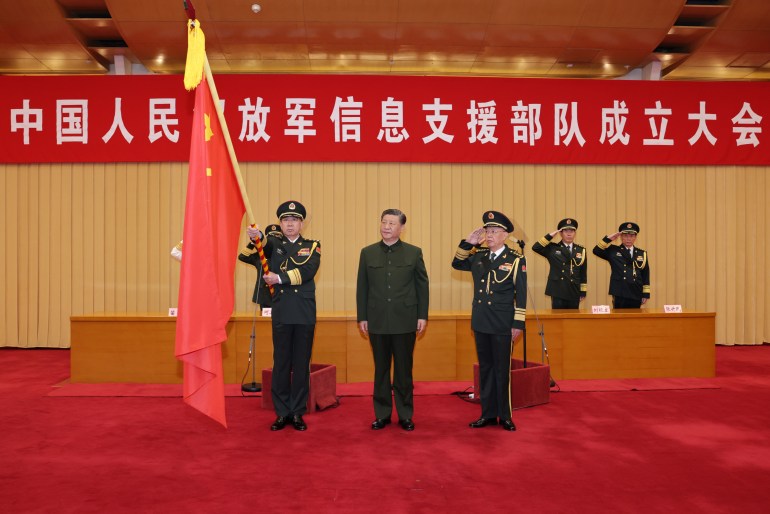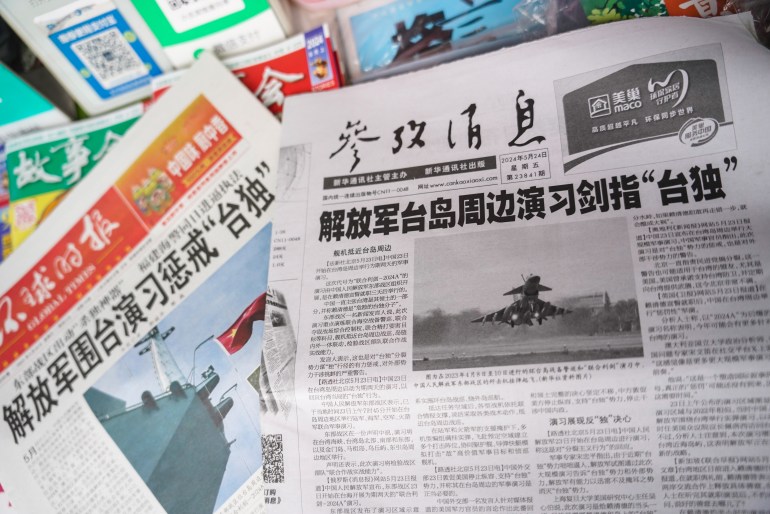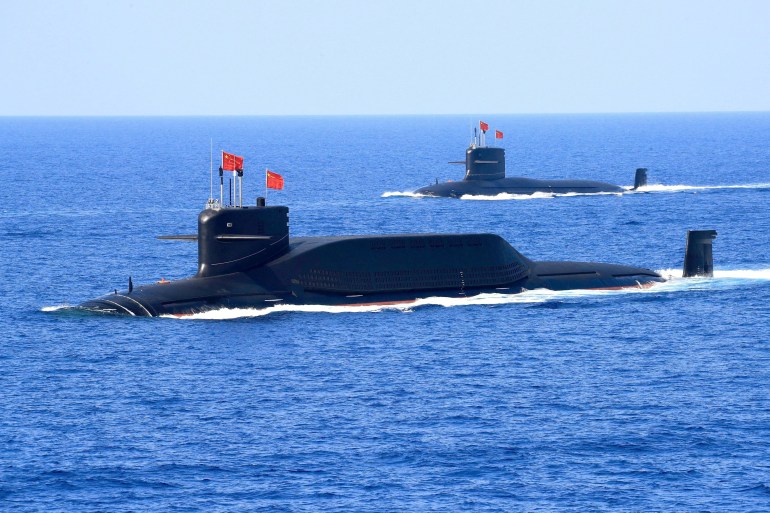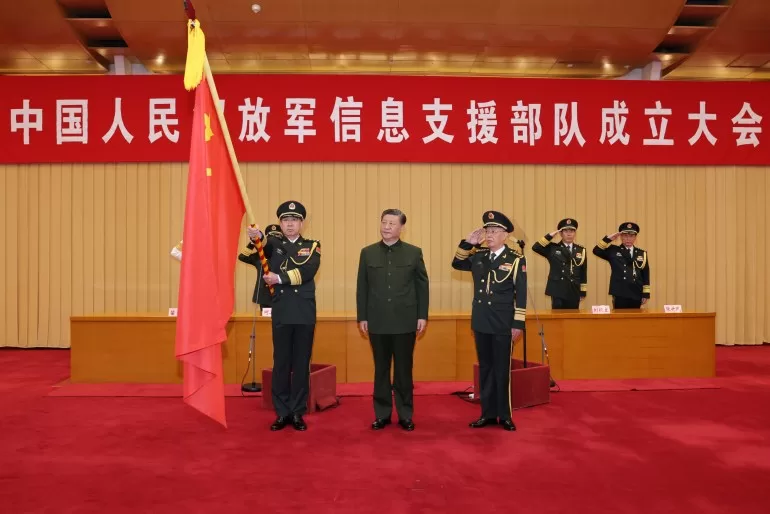In the run-up to Taiwan’s elections in January, the island’s information sphere was bombarded with coordinated cyberattacks and disinformation campaigns.
Beijing claims Taiwan as its own and has not ruled out the use of force to bring the island under its control.
Following the inauguration of the Taiwanese government last month, Chinese military might was on full display as the Chinese armed forces surrounded Taiwan in two days of drills during which Chinese state media released an animated video showing missiles raining down on major Taiwanese cities.
After the exercises, a Chinese military spokesperson said the country’s armed forces remained fully prepared, highly vigilant and ready to take resolute action when it came to Taiwan.
Later in May, China’s newest and most advanced aircraft carrier also sailed out from Shanghai on its first sea trials – placing the Chinese navy second only to the United States in the number of aircraft carriers in its fleet.
But despite the relentless demonstration of the military’s increasing sophistication, some analysts wonder how much confidence Chinese President Xi Jinping has in his armed forces.

Last week, Xi told a military conference that there were “deep-seated problems” throughout the armed forces and change was necessary.
His comments followed a ceremony in April where he unveiled the largest reorganisation of the Chinese military in almost 10 years.
“It came as a shock, and it shows that Xi is not satisfied with the existing structure and the current capabilities of the Chinese military,” Yang Zi, a PhD student at the S Rajaratnam School of International Studies (RSIS) at Nanyang Technological University in Singapore, told Al Jazeera.
Purges and corruption
For many observers, the most unexpected element of the reorganisation was the elimination of the Strategic Support Force (SSF).
“There have been problems, purges and corruption probes in other divisions of the military,” Christina Chen, a research fellow at the Taiwanese security think tank Institute for National Defense and Security Research (INDSR), told Al Jazeera.
“But we haven’t heard of similar trouble within the Strategic Support Force, so there was little indication leading up to this announcement that the SSF was in line to be reorganised.”
Xi was himself involved with the creation of the SSF, which was unveiled at the last major Chinese military restructuring in 2015.
The SSF was an elite body tasked with accelerating the development of armed forces’ space and cyber warfare capabilities and improving data sharing across services and theatres by 2020.
But by mid-2019, a white paper from China’s Ministry of Defence found that SSF progress had been slow even as advanced data and intelligence were expected to play an ever more decisive role in future conflicts.
The end of the SSF indicates a loss of faith in the ability of the 2015 reforms to prepare for such conflicts and suggests the Chinese leadership will be playing an even greater role in military modernisation, according to Chen.
Instead of the SSF, the fields of space, information and cyber warfare are being placed within their own divisions directly under the supervision of the Central Military Commission, which Xi chairs.
The new structure will be vital in helping the Chinese military “fight and win in modern warfare,” Xi said when he announced the reforms.
Modern warfare is a field currently dominated by the United States military, said Chen, who sees the reorganisation as a further indication of Beijing’s determination to catch up with Washington.
Beijing and Washington find themselves on opposite sides in several disputes in the South China Sea, the East China Sea and the Taiwan Strait.

Washington has accused Beijing, which has been involved in a number of confrontations with the Philippines at several contested reefs, of threatening regional peace with its aggressive conduct, while Beijing has accused Washington of meddling in Asian affairs that do not concern it.
“Xi’s long-term goal is to surpass the United States militarily and make China the leading military power in the region and the world,” Chen said.
‘Ruthless adaptability’
The military reorganisation comes amid what has been described as the biggest purge in Chinese military history, with key leaders being fired or disappearing from view.
Much of the upheaval has taken place within the armed forces elite Rocket Force, which oversees Beijing’s tactical and nuclear missiles and was supposed to be among the military’s most capable units.
“The Rocket Force purges of last year showed that the Chinese armed forces are not as ready for prime time as we have previously imagined,” RSIS’s Yang said.
Prominent figures have disappeared as well. The defence minister, Li Shuangfu, who previously served as a deputy commander of the SSF and was considered a Xi loyalist, went missing last year.
Beijing confirmed that Li had been removed in October, nearly two months after he disappeared from view.
The fact that high-ranking officers and officials seemingly close to Xi have not been spared in the purge underlines the shifting landscape of loyalty and power in Chinese elite politics, according to Shaoyu Yuan, a scholar of Chinese studies at Rutgers University in the US.
“Individuals removed might have initially risen under Xi’s patronage but their dismissal signals a recalibration of loyalty and trust as his strategic vision and his perception of potential threats evolve,” Yuan told Al Jazeera.
In Yang’s view, the purges and the recent military reorganisation suggest that Xi has little faith in the commanders who have risen through the ranks in recent times, or in the previous reforms, even though he played a key role in their promotions and the structural changes.
While that might raise questions about Xi’s choices, Yuan said the Chinese president’s reactions to his lack of faith demonstrate his ruthless adaptability as well as his willingness to recalibrate his approach to maintain control and pursue his vision.
“His determination to eliminate any structures or individuals that do not align with his current strategic objectives regardless of their past contributions may reinforce his image as a decisive leader who prioritises the present needs of the state over past allegiances,” he said.

Yuan adds that in the power dynamics around the president, loyalty must be continually earned.
“This approach can create a cycle where trust is perpetually conditional, driving the need for constant reaffirmation of loyalty,” he said.
At a recent military conference, Xi stressed that military officials, especially those at senior levels, had to have the courage to put aside their prestige and acknowledge their shortcomings.
“They must deeply self-reflect … make earnest rectifications, resolve problems at the root of their thinking,” he said.
RSIS’s Yang expects that there will be a greater emphasis on political work within the armed forces, building on last year’s focus on Xi Jinping Thought, the president’s political, economic and social philosophy, throughout the Communist Party.
Such political work could take time away from crucial military training, according to Yang, or encourage talented officers to keep their heads down to avoid the risk of being targeted in any future purges.
“He [Xi] has no qualms about shaking things up and letting heads roll,” Yang said. “But in the end, only time will tell whether these changes will actually enhance the Chinese military’s combat capabilities.”
